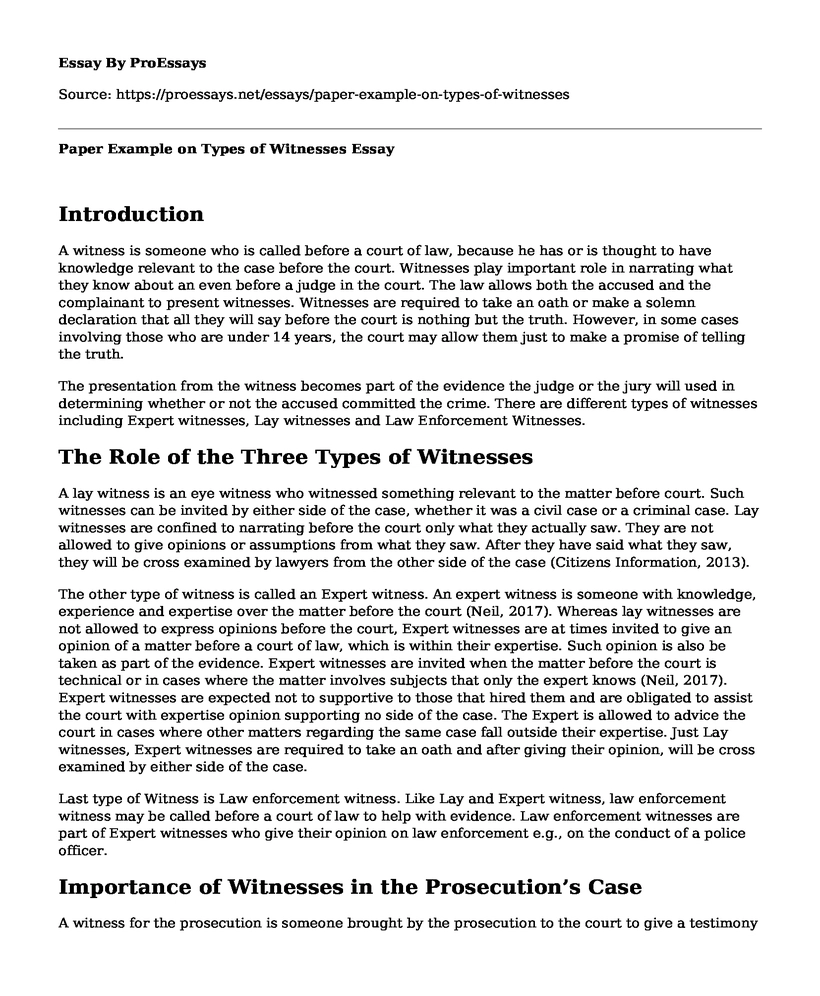Introduction
A witness is someone who is called before a court of law, because he has or is thought to have knowledge relevant to the case before the court. Witnesses play important role in narrating what they know about an even before a judge in the court. The law allows both the accused and the complainant to present witnesses. Witnesses are required to take an oath or make a solemn declaration that all they will say before the court is nothing but the truth. However, in some cases involving those who are under 14 years, the court may allow them just to make a promise of telling the truth.
The presentation from the witness becomes part of the evidence the judge or the jury will used in determining whether or not the accused committed the crime. There are different types of witnesses including Expert witnesses, Lay witnesses and Law Enforcement Witnesses.
The Role of the Three Types of Witnesses
A lay witness is an eye witness who witnessed something relevant to the matter before court. Such witnesses can be invited by either side of the case, whether it was a civil case or a criminal case. Lay witnesses are confined to narrating before the court only what they actually saw. They are not allowed to give opinions or assumptions from what they saw. After they have said what they saw, they will be cross examined by lawyers from the other side of the case (Citizens Information, 2013).
The other type of witness is called an Expert witness. An expert witness is someone with knowledge, experience and expertise over the matter before the court (Neil, 2017). Whereas lay witnesses are not allowed to express opinions before the court, Expert witnesses are at times invited to give an opinion of a matter before a court of law, which is within their expertise. Such opinion is also be taken as part of the evidence. Expert witnesses are invited when the matter before the court is technical or in cases where the matter involves subjects that only the expert knows (Neil, 2017). Expert witnesses are expected not to supportive to those that hired them and are obligated to assist the court with expertise opinion supporting no side of the case. The Expert is allowed to advice the court in cases where other matters regarding the same case fall outside their expertise. Just Lay witnesses, Expert witnesses are required to take an oath and after giving their opinion, will be cross examined by either side of the case.
Last type of Witness is Law enforcement witness. Like Lay and Expert witness, law enforcement witness may be called before a court of law to help with evidence. Law enforcement witnesses are part of Expert witnesses who give their opinion on law enforcement e.g., on the conduct of a police officer.
Importance of Witnesses in the Prosecution’s Case
A witness for the prosecution is someone brought by the prosecution to the court to give a testimony that supports the case by the prosecution. The witness is expected to give a testimony that affirms that the accused actually committed the offense for which they are being tried for. Normally, the prosecution may help the witness to draft a witness statement that summarizes all the facts about his/her testimony. Ideally, the prosecution witness is brought to help in strengthening the burden of proof. Theirs is to confirm the guilt on the defendant. However, with cross examination and questioning, witness statement is hardly used these days. The defendant side will direct their effort in discrediting what the prosecution witness said.
Importance of Witnesses in the Defense's Case
The defense witnesses are equally important. Unlike prosecution witness, defense witnesses are not brought forward to affirm any quilt. They are mainly brought by the defendant to confirm the defendant's innocence. The defense team can always bring a lay witness or character witness. The defense team may bring in a lay witness to counter the testimony by the prosecution witness. In some cases, there may be need to invite a circumstantial witness. In cases of drug trafficking, the defendant may bring a character witness to testify of his/her good character. Character witnesses are equally advised not to give opinions but to stick to facts.
Qualification of an Expert Witness
An expert witness is someone with knowledge, experience and expertise over a matter before a court of law that seems so technical for the presiding team. As such, he/she may be called to give an expertise opinion. There are few things that are considered before one is chosen as an expert witness. According to the Federal Rule of Evidence, an expert witness must possess knowledge, experience, training and education on the said field (Mangraviti, 2012). The expert is required to have several years of experience and must be able to operate within the deadlines given by the court
References
Gambone, A. (2017). Criminal Defense Witnesses And The Prosecution's Burden Of Proof Citizens information. (2013).
Mangraviti, J. (2012). Expert Witness Requirements
Neil, C.O. (2017). The Duties and Responsibilities of Expert Witnesses
Cite this page
Paper Example on Types of Witnesses. (2022, Jul 01). Retrieved from https://proessays.net/essays/paper-example-on-types-of-witnesses
If you are the original author of this essay and no longer wish to have it published on the ProEssays website, please click below to request its removal:
- Who Will Graduate? Disruption of High School Education by Arrest and Court Involvement
- Feminism and Crime Essay
- Administrative Law Memorandum - Essay Sample
- Correction Officers Career Analysis Paper Example
- Battered Women Syndrome as a Criminal Defense - Research Paper
- Essay Sample on Exploring Theories of Crime: Rational Choice & Social Factors
- Research Paper on Youth Crime Prevention: Rethinking Justice Intervention







